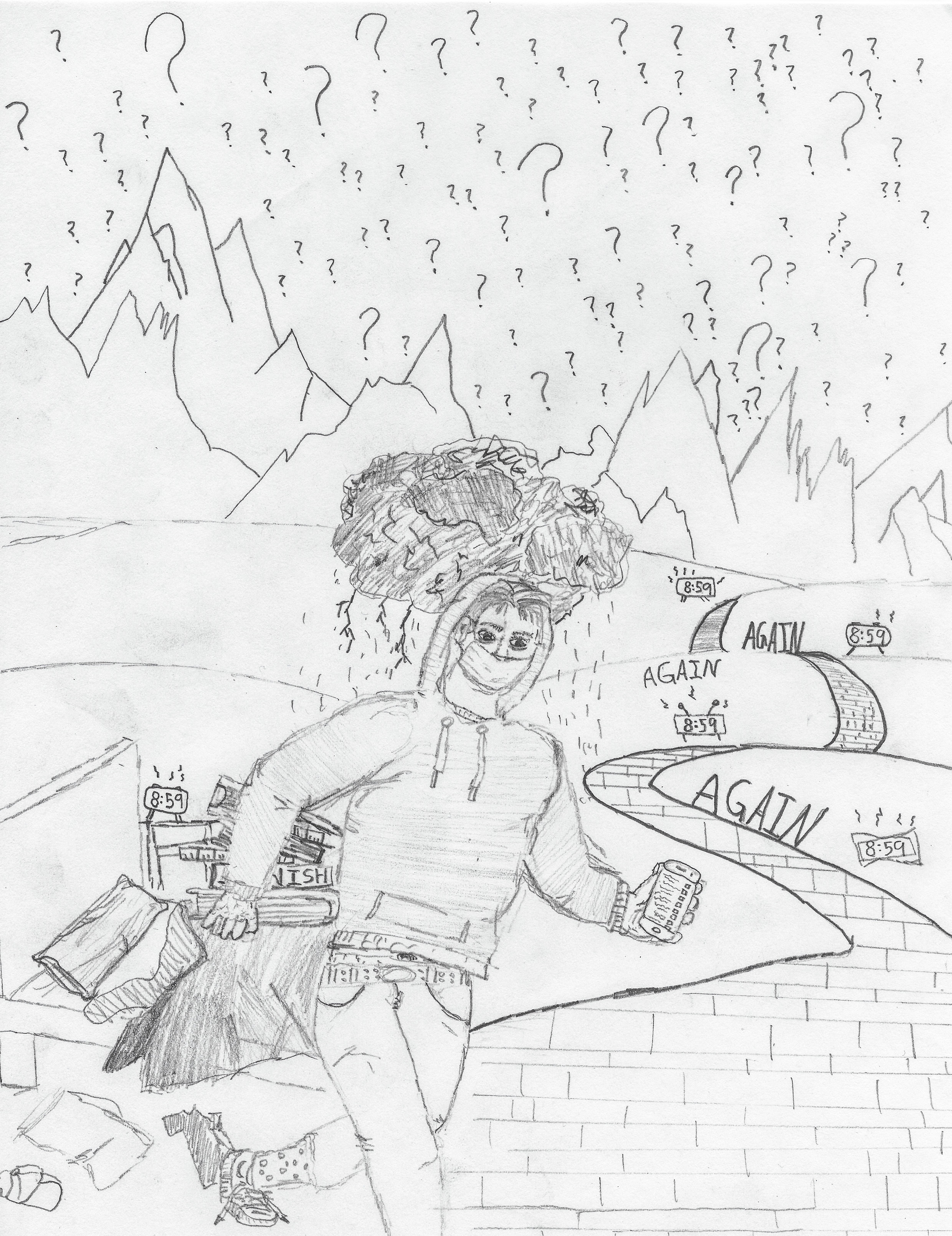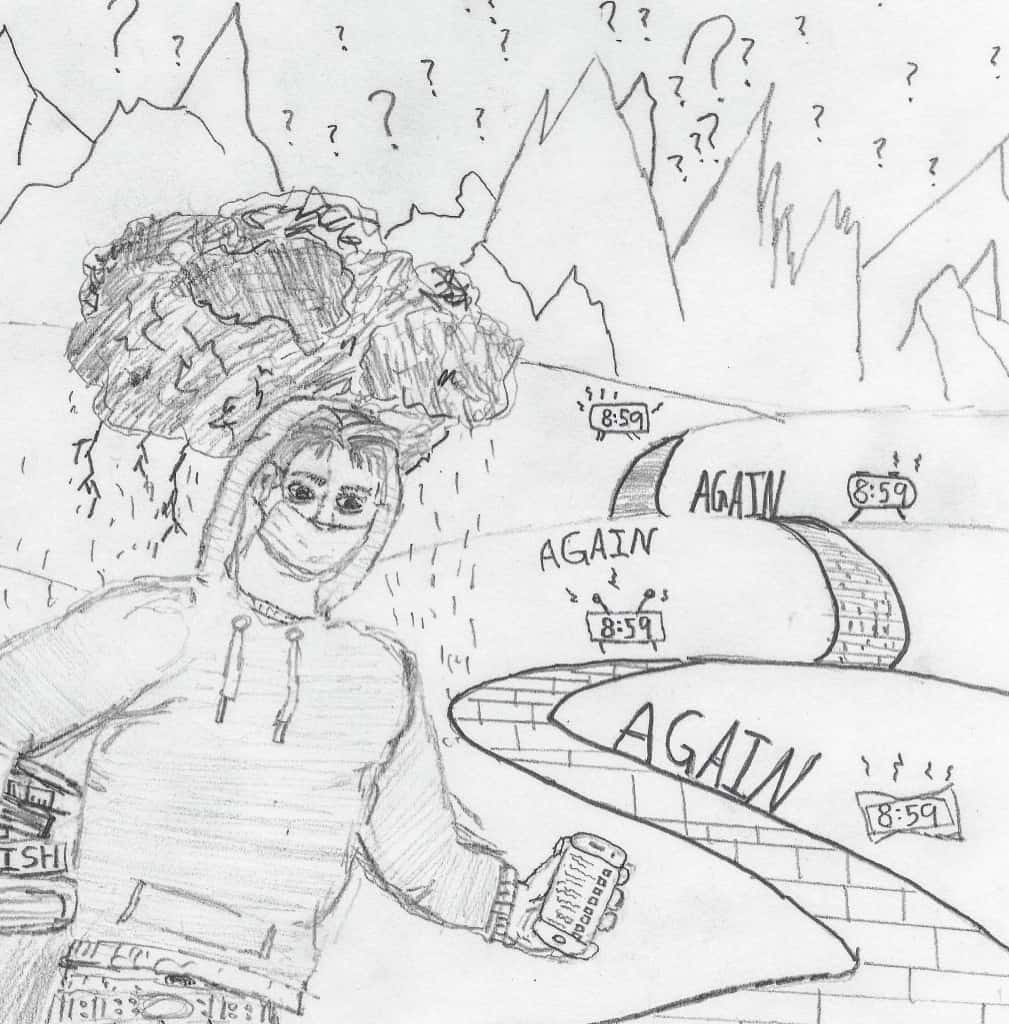
In the shadow of a global pandemic, divisive presidential election, and nation-wide protests for racial justice, Roosevelt students have dutifully returned to remote learning to begin the new academic year – however, data suggests that major changes over the summer have taken a harder toll on the mental health of our student body than expected.
This past month, The Roosevelt News conducted a survey on student mental health, looking to examine to what degree students have been affected by the pandemic and see what they’ve been struggling with most. The results were clear: most students are not OK.
Out of a sample of 233 students, 65% said they felt more stressed than usual for either all or most of the last two weeks.
“I feel like I used to be able to distract myself with people,” writes one student. “Now I’m just alone all the time, so I feel more depressed and way more stressed, which then impacts my sleep, and the cycle repeats itself.”
When asked whether or not they felt increasingly burdened by remote learning during the pandemic, 88% of respondents said yes. 62% of students said yes when asked the same question about reduced social interaction, and 33% said yes about increased conflicts with people close to them.
Participants were given the chance to elaborate on what’s been the most challenging in terms of their mental health since the outbreak of COVID-19 earlier this year.
One student said, “Staying afloat. It’s hard finding a balance in my personal and school life, especially as a junior. I keep telling myself if I do A, B, and C for school I can focus on my mental health next week and finally be happy, but I never end up doing so. I’m just slowly drowning.”
Another said, “The uncertainty. I never know what a day on the news will look like when I wake up.”
A third student wrote about how they struggled with “Existing in [their] own mind more than before.”
Other answers included, “losing friends,” “body image,” “fighting with parents,” “food and eating,” “anxiety from overwhelming amounts of school work,” “lack of rhythm in daily life,” and “not knowing when this pandemic will get better.”
While the vast majority of students have been feeling the weight of the pandemic, a less than proportional amount have sought professional help through Roosevelt’s Teen Health Center (THC). Auky Van Beek, the THC’s physician assistant, said that currently, both she and the center’s mental health therapists are not seeing as many students as they normally would – partly because after school shut down last March, students were unaware of how the THC was adapting.
“Back in the spring, all of us had very little notice,” Van Beek said, referring to the THC’s transition from holding in-person appointments from within Roosevelt to being fully online. “So just like everybody else, we were kind of like, okay. We know that there’s people out there struggling, but we’re not allowed to operate inside school. So we were able to do a phone-only model. And then we started learning how to do video visits, and I was still able to call medications into the pharmacy or, in some cases, hand students their medications. Now, thank goodness, we’re able to operate a full clinic.”
According to Natalie Wonder, one of the THC’s Mental Health Therapists, the clinic is now offering in person medical care at Roosevelt, in addition to their remote telehealth sessions for mental health care. They’ve also started using RingCentral, a digital platform that allows them to directly text and call clients.
Despite this, both Van Beek and Wonder agreed that the clinic continues to face obstacles. “There have been many challenges associated with accessing resources during this time of COVID and remote learning,” said Wonder. “One major concern has been the inequity of resources with the move to online school. The district has worked on addressing the need for access to computers and the internet for remote learning, however the challenges of inequity extend beyond this.”
“Lower-income families are more likely to be working in the service industry where COVID job loss was highest,” Van Beek added. “In these families, a parent may have lost their job or they may be at risk of eviction, and so they’re under a much higher stress level – this increases the chances of discord within the family.
She continues by saying that “families of color are more at risk for these class-related traumas as a result of systemic racism and have the added trauma of racism itself. All of this piles up to affect learning and makes it harder to do well in school.”
This same trend is being reflected in national data. According to a series of surveys conducted by the Pew Research Center last spring – when the first large wave of the virus hit the U.S. – Hispanic and Black Americans were disproportionately affected by job and wage losses caused by COVID-19. Of those surveyed, 61% of Hispanic Americans and 44% of Black Americans reported that they or someone in their household had experienced a wage loss or lost a job due to the pandemic, compared to only 38% of whites.
This said, students can still make gradual changes in their day-to-day lives to better take care of themselves during this time. Van Beek emphasized that in a world where we’re grappling with a new normal, people should try to find certainty in connection.
For those with friends or family who may be struggling with their mental health, it’s important to help them use healthy coping mechanisms – “Like, ‘Hey, let’s go for a walk or let’s write a song together or let’s make up a dance,’” said Van Beek. “Really listen to one another. When someone’s having a hard time, that is a huge gift we can give our friends.”
Wonder pointed to trying to take care of your body and emotional well being through a daily routine. She advises getting a full night of sleep and taking small steps to spend more time outside. Among other things, she suggests incorporating movement into your day, setting aside time to unwind, eating well, and practicing self-compassion.
While students may have heard these things before, consciously working them into daily life can be challenging, especially if they are currently going it alone. It’s crucial that students define growth and progress based on where they are as individuals, rather than looking to what is perpetuated by mainstream society as success.
“We can totally get a storyline running about how we should have understood this. We should have gotten this. We should be doing better,” said Van Beek. “And all of that can be part of what drives anxiety.”
Ultimately, she said to simply “Allow yourself to be where you are. You know what you know, you get what you get. It’s messy and it’s hard. Everybody’s figuring it out. If you need help, you need help. And there’s no shame in it.”
Enrollment and service request forms for the THC can be found on the Roosevelt website. Students can also email alexandram@neighborcare.org, call 206-527-8336, or text the clinic at 206-653-9786.
Students can also reach out to the following crisis lines:
Teen Link: 1-866-833-6546, available for text or call from 2-10pm Monday-Friday and 6-10 pm Saturday-Sunday
King County Crisis Line: 206-461-3222 or 1-866-4CRISIS

And don’t forget your school counselor. My 3 years of work for my master’s degree was all about counseling, not schedule changing and writing college letters, like we often get stereotyped as our roles. While we are not mental health counselors, we are versed in theory and practice, for helping students remove roadblocks to learning. Often, students might not need full fledged mental health counseling (which the THC is excellent at!), and might just need someone to talk to and unpack some things with. We are here for that. SCHOOL COUNSELORS….MORE THAN SCHEDULE CHANGERS!!!!!